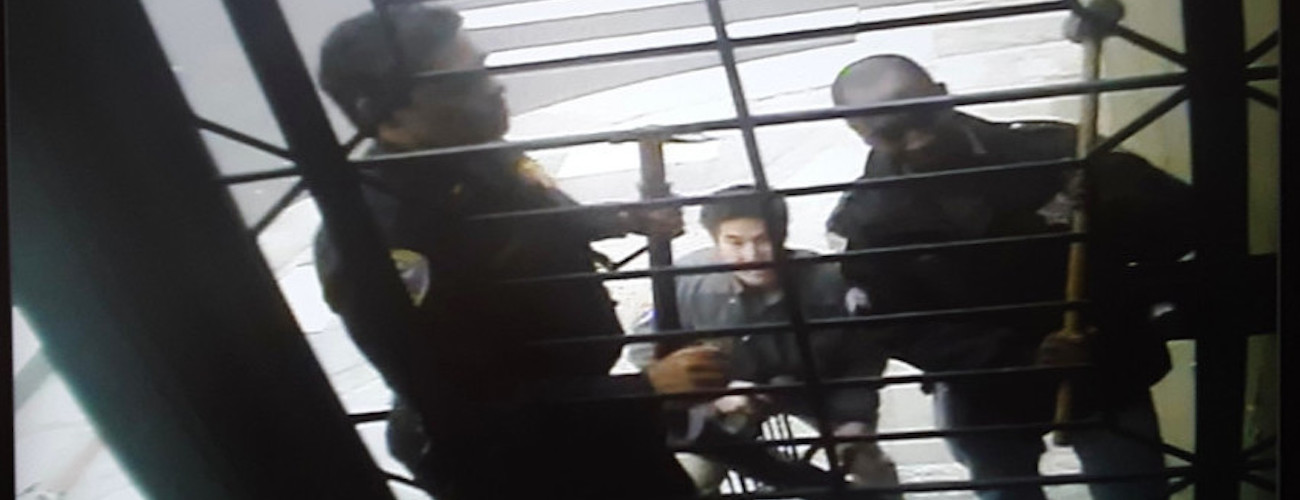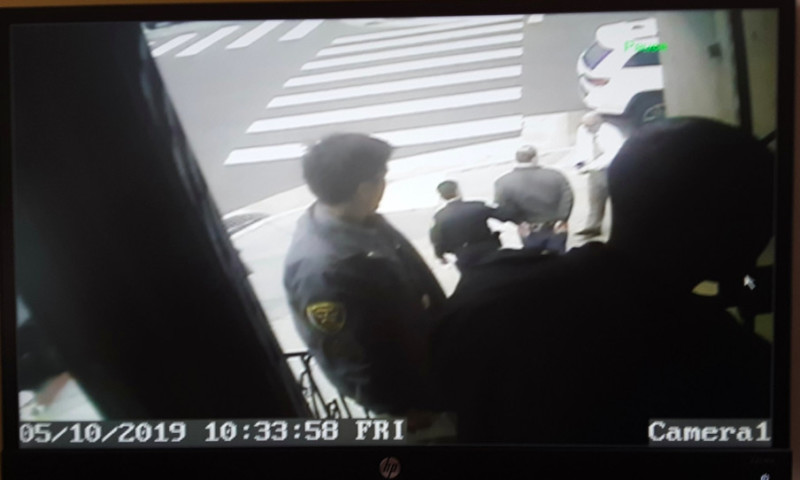Sign up for the daily CJR newsletter.
Bryan Carmody, a freelance journalist in San Francisco, often works the night shift, shooting videos of car crashes, police chases, structure fires, and other breaking news events, and selling them in the morning to the Bay Area’s local television stations. So he was asleep at 8:20am on Friday when police officers started banging on his front gate with a sledgehammer. The officers had a warrant, and they handcuffed Carmody for five and a half hours while they searched his home and then his office, five miles away. They were looking, Carmody says, for the identity of an anonymous source who had given him a police report on the recent death of San Francisco Public Defender Jeff Adachi.
“They searched my house at gunpoint,” Carmody says. “They were running around like they were a SWAT team, even though they weren’t.”
ICYMI: NY journalist handcuffed to railing over his head
This was an extraordinary step by San Francisco police, the first such raid of a journalist’s home or office that Carmody’s lawyer, Thomas Burke, can remember. Pressure to unmask anonymous sources is nothing new, nor are legal threats against government employees who leak documents. But police officers storming into a journalist’s home with their guns drawn is nearly unheard of, frowned upon by custom and statute.
“Search warrants for journalists are very, very rare,” Burke, a partner at Davis Wright Tremaine in San Francisco and a lecturer in media law at the University of California, Berkeley, Graduate School of Journalism, says. “They just don’t happen, and they shouldn’t happen.”
Carmody is an imperfect free-speech martyr. Other Bay Area journalists describe him as something of a troll, barraging them with angry tweets when they reported stories critical of the police, or when they were arrested while covering protests. But there is a consensus among journalists and free press advocates that this police raid crossed a line.
The law in California is clear: Carmody should be able to keep his confidential source confidential. The state constitution includes a strong media shield law that protects journalists from having to disclose any unpublished information, including the identities of sources.
They wanted to intimidate him into giving up the source by taking his equipment, which stops his work, his livelihood as a journalist.
In some states, and at the federal level, courts can and do issue subpoenas demanding journalists turn over the names of sources. But the San Francisco Police Department did not go to court for a subpoena. It asked a judge to sign warrants so officers could scour Carmody’s home and office for evidence. In the process, the officers seized Carmody’s computers, phones, and other equipment and information.
“It’s very clear they’re looking for the name of a confidential source,” Burke says. “That was an act of intimidation. They wanted to intimidate him into giving up the source by taking his equipment, which stops his work, his livelihood as a journalist.” Carmody says he has no plans to identify his source.
NEW AT CJR: The heavy crown of Gretchen Carlson
A San Francisco Police Department spokesman refused to answer any questions about the search. The department issued a statement that said the search was “part of a criminal investigation into the illegal release of the confidential Adachi police report and subsequent sale to members of the media.”
That phrase—“subsequent sale”—rankles Carmody. A few weeks ago, two officers from the San Francisco Police Department’s internal affairs division came to his home and asked him to give up his source, which he declined to do. Carmody says those officers were interested in whether he had paid his source for the document. “That could be a federal case, if an officer sold it to me,” Carmody says. “That’s public corruption.”
Carmody says he did not give his source anything of value—“not even a cup of coffee”—and he told the officers as much. After Carmody obtained the documents about Adachi’s death, he sold his report on them to three local news outlets, just as he sells all of his stories. Local stations had the story February 23, the day after Adachi died.
“They say, ‘You’re selling this document.’ That’s not accurate,” Carmody says. “I’m selling a story, and that story includes photos and videos and documents and other supporting evidence.”
Adachi was the city’s public defender for 17 years and was a vocal advocate for police reform and the rights of the accused. His death at age 59—brought on, a medical examiner concluded, by a mixture of cocaine and alcohol—was a major story in San Francisco. There was no evidence of foul play, and no cocaine found at the apartment where he died. But the reports and photos taken by police at the scene, which were leaked to Carmody and aired on local news broadcasts, included references to “an unmade bed,” the woman Adachi was with, and cannabis gummies and alcohol found in the apartment.
Some people in the city, including freelancer Joe Kukura in SFist, thought police officers were trying to smear Adachi with the leak. Carmody says he won’t speculate about his source’s motives for leaking the report.
Carmody, 49, has been working as a stringer in the Bay Area for 29 years. He has his own news agency, North Bay News, which functions as a small freelance cooperative. It’s the same job that was featured in the 2017 Netflix reality show “Shot In The Dark,” though Carmody says the market in San Francisco is nothing like the cutthroat world of Los Angeles stringers in that show.
Carmody is well known and not particularly well liked by other Bay Area journalists. Not long after the news of the police raid hit Twitter, the Oakland-based journalist and illustrator Susie Cagle posted, “I blocked this guy several years ago because he used to constantly harass me. But this raid is no less outrageous.” Vivian Ho, a reporter with The San Francisco Chronicle from 2011 to 2017, echoed the sentiment, tweeting, “Bryan Carmody’s harassment of me and other reporters was repugnant and inexcusable, but so is this raid.” Other journalists replied with similar comments.
Cagle and Ho both say their unpleasant encounters with Carmody happened years ago, and neither saved any messages or screenshots of his comments. (Carmody has deleted his old tweets.) Both journalists say Carmody sent them insulting tweets after they were arrested while covering the Occupy Oakland protests in 2011 and 2012. Carmody also covered the Occupy Oakland protests. “He was particularly vile to me while I was covering Occupy in Oakland, where I was arrested twice while working, which he thought was great,” Cagle said in an interview conducted over Twitter direct messages.
Ho said her interactions with Carmody were similar.
“I covered a lot of protests. Anybody who didn’t appear staunchly pro-police in their coverage was somebody he harassed,” Ho said via direct messages. “I don’t remember the exact things he said to me, but it was something along the lines of when protestors hurt me, the police won’t help me.”
Asked about Ho’s recollections, Carmody says he was being “snarky,” and adds that he found Ho’s reporting to be reflexively anti-police. Still, he doesn’t dispute Ho’s recollection and says the comment about police not being there to protect her from protestors was “a true statement.”
Ho and Cagle both see irony in the fact that Carmody positioned himself as the pro-police journalist and then wound up with police raiding his home and newsroom. “If I were optimistic I would say maybe it would change his perspective on police and press freedom,” Cagle messaged. “But I’m not.” Carmody says the incident hasn’t changed his outlook. He distinguishes between the department brass and internal affairs investigators, who were behind the raid, and the rank-and-file officers.
On Monday, Burke wrote to San Francisco Police Chief William Scott, asking the department to return all of the materials taken during the search, or refrain from reviewing them until the legal challenge is resolved. Police took more than dozen of Carmody’s computers and cell phones in the raid, according to the letter. “The San Francisco Police Department seized and has control of his entire news operation,” Burke wrote, “illustrating vividly why such warrants are not permitted under federal and state law.”
ICYMI: WSJ reporter explains why he was fired
Has America ever needed a media defender more than now? Help us by joining CJR today.








